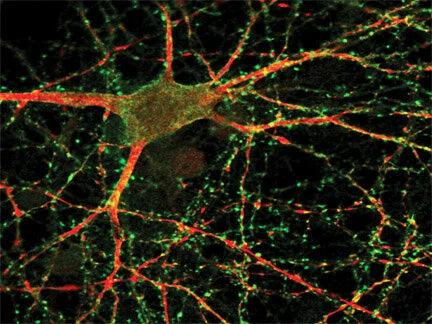Understanding synapse degradation could lead to Alzheimer’s treatment
by Chuck Bednar for Red Orbit:
The discovery of how brain cell synapses degrade during the early stages of Alzheimer’s disease could eventually lead to new ways to treat this deadly form of dementia.
In a study published Friday in the journal Nature Communications, Dr. Vladimir Sytnyk of the School of Biotechnology and Biomolecular Sciences at the University of New South Wales and his colleagues explained that they studied a type of protein, neural cell adhesion molecule 2, that helps physically connect the membranes of synapses in the brain.
Neural cell adhesion molecule 2, or NCAM2, also helps stabilize synaptic connections between neurons, they explained. The loss of synapses and the destruction of neural connections are some of the first signs of Alzheimer’s disease, Dr. Sytnyk said. It occurs early on in the disease, when patients typically only have mild cognitive impairment and well before nerve cells die off.
“Synapses are required for all brain functions,” he explained in a statement, “and particularly for learning and forming memories.” He added that he and his UNSW associates had “identified a new molecular mechanism which directly contributes to this synapse loss – a discovery we hope could eventually lead to earlier diagnosis of the disease and new treatments.”
NCAM2 broken down by beta-amyloid protein
Dr. Syntnyk’s team used post-mortem brain tissue from both Alzheimer’s patients and people who did not have the condition. By analyzing this tissue, they discovered that individuals that had the disease had lower levels of synaptic NCAM2 in the hippocampus, which is among the first parts of the brain to be affected by the disease.
Furthermore, mice studies and laboratory research both demonstrated that NCAM2 was broken down by beta-amyloid, another type of protein that makes up the majority of the plaque which is known to accumulate in the brains of people suffering from the neurodegenerative condition.
“Our research shows the loss of synapses is linked to the loss of NCAM2 as a result of the toxic effects of beta-amyloid,” said Dr. Sytnyk, who worked with first author Dr. Iryna Leshchyns'ka of the UNSW School of Biotechnology and Biomolecular Sciences. “It opens up a new avenue for research on possible treatments that can prevent the destruction of NCAM2 in the brain.”
Source: http://bit.ly/1IhLcGk

